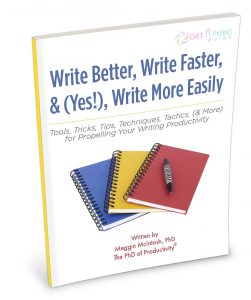Improving Your Writing by Kerry Seymour
 Here are questions to ponder that will lead you to know yourself better as a writer, with the hope that this knowledge will lead to new heights of writing productivity.
Here are questions to ponder that will lead you to know yourself better as a writer, with the hope that this knowledge will lead to new heights of writing productivity.
- Are you waiting for some external force to whisper prose in your ear and inspire a flow of words? Fuhgedaboudit. Writing is an inside job. Examine your expectations or listen to your self-talk to learn if you’re a self-promoter or self-saboteur when it comes to your writing.
- How do you summon your inner muse? Give some thought to what physical setting or environment is the most conducive to writing for you. Is silence or music more stimulating? Do you like to be at a desk or sitting outside on your deck? Do you always have paper and pen handy to capture those thoughts and phrases that bubble momentarily to the surface of awareness that are worthy of permanence?
- What’s your preferred source of caffeine? Most of us get a creative productivity boost from a moderate dose. Do you know the amount that, when exceeded, becomes counter-productive?
- Is that killer opening sentence hanging you up? How long did it take Melville to come up with Call me Ishmael or Dickens It was the best of times, etc? I’m betting those were not their first words on the paper. It’s possible that your great first sentence will come after you’ve drafted the whole story or article. The same concept holds true for professional journal articles. It’s usually helpful to hold off on writing the abstract until the first draft of the document is completed.
- Where are you on the Perfect-o-meter 1 to 10 scale? Is it OK to be a “7” or “8” or is being a “10” not quite good enough? Try dialing the expectation down a notch, take some of the pressure off and see if the words don’t flow more readily.
- Along the same vein, do you compare your writing with those you admire and feel that you come up short? Cultivate appreciation for your own unique voice. Whether you are as terse as Hemingway or as free-flowing as Joyce, be true to your tendencies. Your imagination and the filters of your experiences, character and temperament potentially make everything you write original and special.
- Does writing with a deadline allow you to do your best work? Not if you are typing the period of the final sentence as the deadline looms. For you to edit with even a semblance of objectivity, you need a break from the document. Give yourself at least a day or two to bring fresh energy and perspective to the task. If you will have another person edit or give constructive criticism, allow sufficient time prior to the deadline to give them the draft so they can do their task justice.
- Are you writing for your eyes only? If Yes, then you may not need that editor or objective second opinion. If you hope to publish, getting input from others will only strengthen your work. You may have created what you believed was a work of brilliance, but if the references are too personal or the grammar eccentric, you won’t connect with your audience.
- Just who is your audience? Be very clear about this at the outset because it will determine everything about your document: from concepts presented, word choices, sentence structure and length to layout.
- Are you generous or stingy with your self-praise and rewards? Unless highly neurotic or a tad kinky, most sensate beings respond better to positive encouragement than threats and abuse. What incentives truly motivate your writing? Is seeing a final draft reward enough or do daily or periodic incentives make a difference?
You will know your writer’s self a bit better once you’ve taken the time to answer or reflect on these questions. If there were one or two items that resonated for you, write down a positive action step you could take to begin to address that issue.
© Kerry Seymour is the Area Extension Specialist with University of Nevada Cooperative Extension. Her writing ranges from nutrition education curricula for elementary school students to professional journal articles. She is a regular contributor to the Reno Gazette Journal Master Gardener column. E-mail: seymourk@unce.unr.edu
 Whether you write for pleasure, to discover, to get paid, as a part of your work, as a way to instruct, or for any other purpose, streamlining your writing process is essential. The Get a Plan! Guide® to Writing Better, Faster, & (Yes!) More Easily: Tools, Tricks, Tips, Techniques, Tactics, & More for Propelling Your Writing Productivity.
Whether you write for pleasure, to discover, to get paid, as a part of your work, as a way to instruct, or for any other purpose, streamlining your writing process is essential. The Get a Plan! Guide® to Writing Better, Faster, & (Yes!) More Easily: Tools, Tricks, Tips, Techniques, Tactics, & More for Propelling Your Writing Productivity.
Inside this essential Get a Plan! Guide, you’ll find nearly 70 practical, easy-to-implement ideas that will propel your writing productivity.




